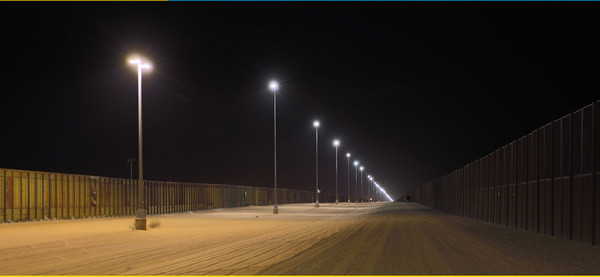The U.S. Department of Energy has released a GATEWAY report on a trial demonstration in which the incumbent quartz metal halide (QMH) area lighting was replaced with LED at three pole locations along a 7.2-mile stretch of the Yuma (Arizona) Sector Border Patrol Area. This high-luminous-flux and high-temperature application is not unique, and similar applications can benefit from the findings of this installation – including correctional facilities, military bases, and, more generally, street and area lighting.
 |
|
Yuma (AZ) Sector border lighting, showing the 40-foot pole height of the LED luminaires (on the first pole) and the 64-foot height of the incumbent QMH luminaires. (DOE/LEDinside) |
Among the findings from the Yuma demonstration:
-
The LED system was found to equal or better the QMH system in terms of both illuminance and uniformity, and confirmed SSL's ability to reduce energy consumption and improve lighting quality.
-
Plans to incorporate a next-generation LED package in the new luminaires increased the expected energy savings to 69%.
-
A 24-foot reduction in pole height increased projected energy savings, due to a reduction in lumen output required at a lower height, and decreased expected annual cleaning costs, due to reduced lift and labor costs.
-
The advanced optical system of the LED luminaires improved the illuminance uniformity of the lighting system, despite the reduction in pole height.
-
The combination of the optics and lower pole height reduced stray light considerably.
-
The expected annual maintenance cost savings include considerable reductions in maintenance visits required.
DOE plans to continue to track the progress and performance of this installation over the coming months. If high-flux LED technology performs well in a region with high ambient temperature and solar radiation, it can perform well in most outdoor environments.
The full report can be downloaded from the DOE SSL website.












